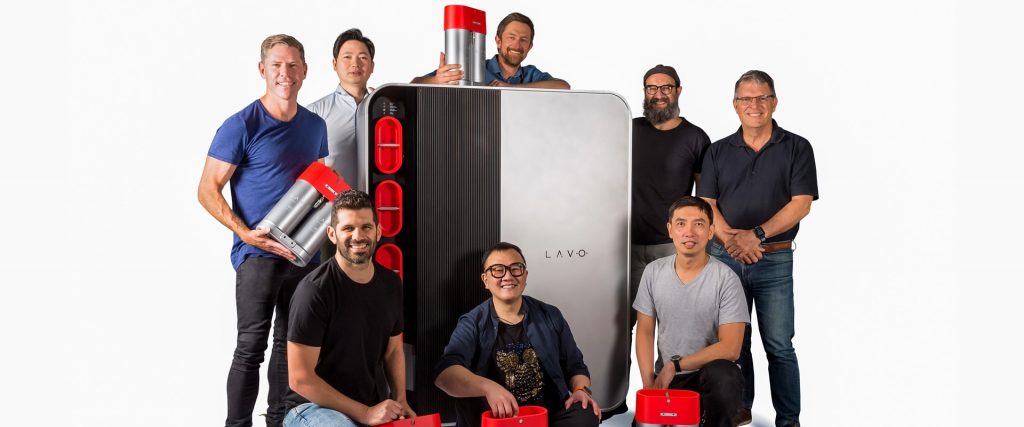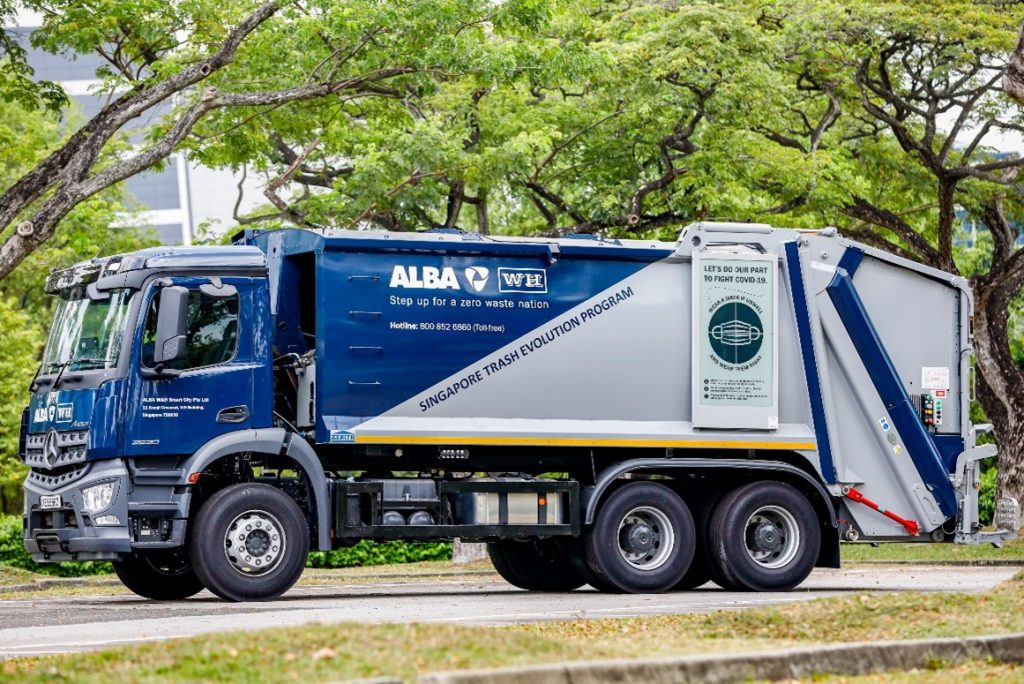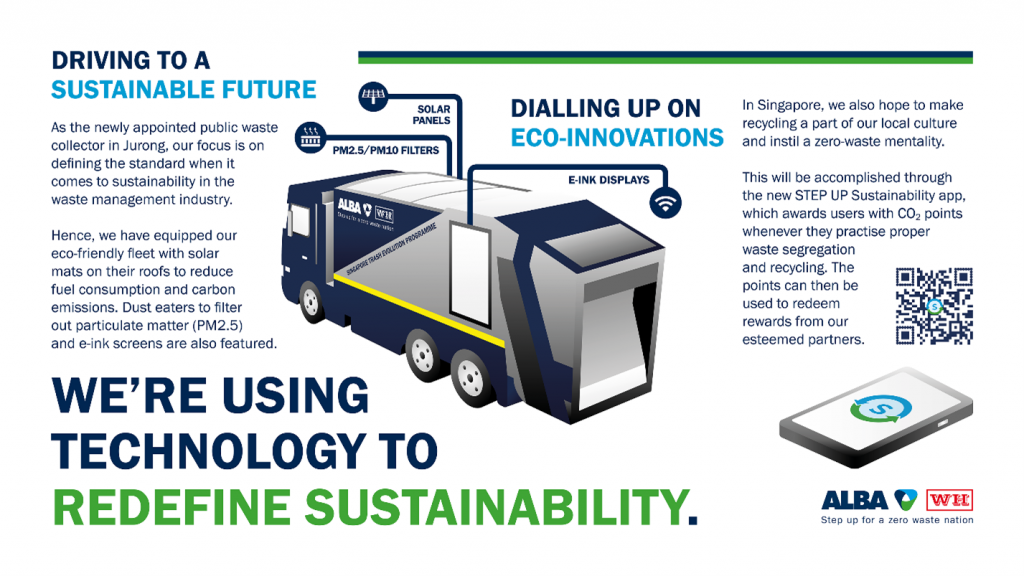Good Morning 👋
Musk tweets about wanting to donate $100M to the best carbon capture technology…The world replies back, quote “Trees”.
That’s carbon capture company that Chevron invested in that we reported on last week might be a cool one to get those funds.
In Your Inbox: LAVO is releasing a hydrogen based storage system for homes; How a 50 year old recycling company thinks about sustainability

You’ve heard of the Powerwall by Tesla – a lithium ion based battery pack for your home. It’s core purpose is to ensure your home is backed up during outages and can store any excess solar power, should you have a solar system at home.
We’ve also seen the re-emergence of hydrogen – especially for heavy machinery where the energy density and weight advantages almost immediately disqualify current lithium ion tech.
LAVO is betting that hydrogen becomes ubiquitous in the residential/consumer space as well – proposing a 40 kWh hydrogen battery that competes with the Powerwall 2 – which has 3x less capacity than the first iteration of a hydrogen battery from LAVO.
At $34,740, the Australian startup needs early adopter support from wealthy hydrogen enthusiasts to truly buy the time it needs to make it cost competitive with current lithium ion tech. To put it in perspective, most homes don’t need 40 kWh of storage and if you bought 4 Tesla Powerwalls it would cost with installation $33,000…
LAVO is one of many startups yet to emerge in the hydrogen economy. The applications for hydrogen based energy storage are numerous, however it requires that significant effort be put into figuring out the economics of implementing hydrogen over the current existing storage alternatives. In many cases hydrogen loses to lithium, but should economies of scale actually support thesis of rapid price reduction – attempting to force hydrogen into the consumer space in any way possible would open up huge opportunities for hydrogen to take over as the primary energy storage technology.
Sign up for The Impact and learn the perspectives behind the latest sustainability trends

This week Sandra Sajen from ALBA W&H Smart City talks about their solution for waste collection, and how they are thinking about the future of the sector.
ALBA W&H Smart City (ALBA W&H) is a Joint Venture company between the 50-year-old German company, ALBA Group, and the local waste collection company, Wah & Hua Pte Ltd. The ALBA Group, one of the leading recycling and environmental services companies as well as raw material providers worldwide, operates with its two brands – ALBA and Interseroh – within Germany, Europa and Asia.
In 2019, ALBA Group saved 4.2M tons of greenhouse gases and 32.3M tons of primary raw materials through its recycling activities. In April of 2020, the National Environment Agency (NEA) of Singapore awarded the new Public Waste Collection contract for the Jurong sector to ALBA W&H Smart City. As the appointed public waste collector, ALBA W&H provides refuse and recyclables collection services to over 156,000 premises – comprising 151,000 households and 5,000 trade premises, including hawker and market stalls, shops, places of worship, and government buildings.
As a part of the solution, we introduced for the first time, as The Straits Times term it, “Eco-friendly Waste Collection Fleet” for refuse and recyclables collection.

Our fleet of trucks are retrofitted with sustainable features, like solar mats on roofs to decrease carbon emissions, dust-eaters to filter out particulate matter from the air, and feature e-ink screens on the sides to spread environmental awareness. We use a fully digitalized dynamic route planning software to plan and carry out daily refuse and recyclables collection. This enables collection activities to be tracked, specifically weights of the bins being measured by RFIDs and weight sensors. Our truck fleet includes side-loader trucks which decreases the manpower dependency from 2-3 people to 1 person, in addition to dual-compartment trucks, which collect recyclables and garden waste at the same time, reducing the number of collection trips required.
Keeping in pace with NEA’s environmental target of reaching 70% recycling rate by 2030, ALBA W&H introduced a specially developed app called STEP UP Sustainability which lets users collect green bonus points through proper waste segregation and recycling. The STEP UP Sustainability App is a pioneering mobile application that rewards users with green bonus points, known as CO2 points for their recycling efforts. CO2 points represent the amount of CO2 emissions that one could save through recycling actions. “The main intention of the app is to address the issue of low recycling rates by helping the public associate trash with value, make recycling more convenient and instill a zero-waste mindset,” said Jakob Lambsdorff, CEO of ALBA W&H. Users can redeem the points to gain vouchers and discounts with our list of sustainable redeem partners. The app also helps people locate the nearest recycling bins and cash-for-trash events. Additionally, the app provides tips and awareness for leading a sustainable lifestyle.
All in all, ALBA W&H stands as an innovation leader in the space, combining smart and productive technologies with sustainable approaches in the public waste collection realm.
The NEA has been incentivizing and pushing companies to improve the existing collection mechanisms and has introduced the Zero-Waste Master Plan to improve the overall recycling quota and upgrade the environmental services industry in Singapore. They are also very keen on piloting new automated and digitalized technologies in the market in line with the Industry Transformation Map to decrease the dependency on foreign manpower. This urges the players in the market to bring in state-of-the art technologies, leading to improvement for many stakeholders in the ecosystem: recycling rates will increase while pollution from waste collection activities will decrease, leading to a more sustainable society; customers will benefit from improved collection services; workers will benefit from higher salaries.
Our customer, the National Environment Agency is particularly interested in data, which they can utilize to improve the waste management infrastructure. We designed our operations to accommodate this additional demand and nowadays start to collect not only waste but also data.
We feel the waste management and environmental services industry is getting more traction than ever before. Being in the waste collection field, we have the responsibility to not just collect the waste but also to ensure that people are aware of the problems and educated on recycling and reducing waste. In Singapore, the industry must overcome the challenge of establishing a Zero-Waste society with multiple dedicated waste collection schemes while facing the constraint of reduced manpower. The solution can lie in digitalized and demand-based collection solutions, as well as autonomous vehicles, which would hopefully be the key to minimize our dependency on manpower. We are actively exploring technological mega-trends such as AI, IoT, big data, and autonomous driving on their potential for waste management applications. This is why we perceive our trucks as more than just trucks – by exploring machine learning and AI, statistics, and database systems, these trucks will serve as the IoT platform that aids industry transformation in Singapore. The key in analyzing data to improve the daily operations and optimize the solutions.
Writers: Swarnav S Pujari, Daniel Kriozere
If you aren’t absolutely thrilled with The Impact, reply and let us know why. Or you can unsubscribe from all updates by clicking here.
Copyright © The Impact 2021. All Rights Reserved || 19 Morris Ave, Bldg 128, Brooklyn NY 11205
Develop your market map of up-and-coming climate startups and market opportunities by subscribing to our weekly newsletter for free.